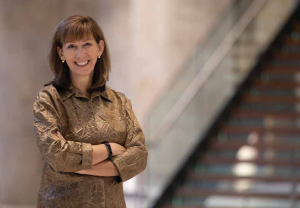From the Founding of the URI College of Nursing to Service During a Global Pandemic
By Christopher Barrett ’08
When Paula Viau-Hann (‘69) attended the University of Rhode Island as a nursing student in the 1960s, an orange stood in for an arm for practice injections. Students in blue pinned striped dress uniforms, white shoes, and caps squeezed into a cramped lab.
Each day an unlucky student was “volunteered” to lug a weighty pharmacy reference book to hospitals. Clinical research was reserved for medical schools. The 30 or so graduates a year expected to be employed in hospitals or visiting nursing associations.
Today, URI nursing education looks vastly different.
Seventy-five years after the founding of the College of Nursing, about 850 undergraduate students and 150 graduate students access a dedicated Nursing Education Center with labs stocked with interactive patient simulated manikins, sophisticated technology, and faculty steeped in leading research about patient care, nursing practice and policy. The college’s partnerships extend beyond nearby hospitals to encompass research projects around the world.
 “The college and faculty always embraced being responsive to the changes in the health delivery system, to student clinical experiences and to what was happening on the national level,” said Viau-Hann, who went on to serve on the URI nursing faculty and retired in 2008 as associate dean of nursing emeritus.
“The college and faculty always embraced being responsive to the changes in the health delivery system, to student clinical experiences and to what was happening on the national level,” said Viau-Hann, who went on to serve on the URI nursing faculty and retired in 2008 as associate dean of nursing emeritus.
The college started the first nursing baccalaureate program in the state and conferred its first degree in 1947 during an era when hospitals hosted most nursing programs. Today, the nationally accredited URI program stands apart from hospitals — figuratively and literally.
While maintaining a presence on the Kingston campus, the college in 2017 opened the Rhode Island Nursing Education Center in Providence, RI, in partnership with Rhode Island College and Brown University. The center puts students just minutes from some of the leading hospitals in the state and provides tens of thousands of square feet of lab and teaching space.
“The center elevated the role of nursing and URI and provides a significant advantage for the students because you’ve got five hospitals nearby,” said Edward Quinlan (’76), the former president and CEO of the Hospital Association of Rhode Island.
While the nursing center makes a prominent splash, the college has, at one point or another, worked with every hospital in the state. Hospitals scramble to recruit graduates, resulting in many leadership positions dominated by URI alumni.
“They’ve made a significant difference in the quality of care that is delivered in Rhode Island,” Quinlan said. He notes that Miriam Hospital Chief Nursing Officer and URI alumni Maria Ducharme ‘96 and Rebecca Burke ’76 guided the institution to obtain the prestigious Magnet Hospital nursing designation six times, an honor achieved only by a handful of hospitals in the nation.
 In 2020, the novel coronavirus pandemic put Miriam and other Rhode Island hospitals to the test. The state generally received high marks for its response in no short thanks to the hard work of nurses, including those URI alumni.
In 2020, the novel coronavirus pandemic put Miriam and other Rhode Island hospitals to the test. The state generally received high marks for its response in no short thanks to the hard work of nurses, including those URI alumni.
And when the pandemic hit, college faculty, staff, and students sprang into action. Students collected thousands of N-95 masks for health care workers. Nursing Clinical Assistant Professor Wylie Dassie deployed with his Army Reserve unit to New York City to care for patients. Clinical Assistant Professor Mary Cloud took to the phones to inform patients testing positive for COVID-19 of their results and next steps while other faculty staffed the phones at the RI Department of Health taking questions from worried Rhode Islanders. College staff gathered up patient beds to send to field hospitals.
The academic leadership stepped into overdrive, revising the curriculum for a health care system forced into virtual visits. In spring 2020 the college strategically hired Research Professor Kimberly Arcoleo who has a background in telehealth. She and nursing Dean Barbara Wolfe now find themselves working to bolster the curriculum around virtual health care delivery. Wolfe also submitted a successful federal supplemental grant to fund the initiative. Meanwhile, every faculty member moved to swiftly transform in-person instruction to virtual or socially distanced learning.
“The response to the pandemic was really a testament to what the College of Nursing community is about,” Wolfe said.
The pandemic response served as just the latest impact of the college on health care. Viau-Hann points out the research of Professor Judith Mercer and Associate Professor Debra Erickson-Owens changed the view on when to clamp umbilical cords following delivery of preterm babies. Rather than clamping as quickly as possible, the two urged a delay to provide more blood from the mother to the baby during the first moments of life. The concept is now considered best practice and endorsed by the American Academy of Pediatrics and the American College of Nurse–Midwives.
Professor Mary Sullivan operates one of the longestrunning research studies of babies born prematurely spanning some 30 years. Associate Dean Katherine Hutchinson is rolling out a nationwide program for college health service departments to reduce risky behavior of college students. This year, Professor Betty Rambur was appointed a commissioner on the Medicare Payment Advisory Commission that advises the U.S. Congress on Medicare policy.
“We now have an impact that is national and international,” Wolfe said.
Wolfe and others credit the college’s success to a long history of strong leadership and investment in the college by the University and the state. They say the influence of the college’s first director Louisa White carries to this day.
As a member of the State Committee on Nursing Education in 1943 White advocated for a nursing program teaching more than direct patient care. In a move almost unheard of at the time, she outlined a curriculum with a liberal arts component leading to a bachelor of science degree. By 1946, White found herself as director of the program housed within the School of Home Economics. A three-part curriculum consisted of academic study, pre-clinical experience at a hospital and clinical study.
“She had the vision, the wisdom, the courage and the tenacity to move this agenda forward and establish a nursing program in a university environment,” Wolfe said of White.
The program rapidly took steps to establish itself and, by 1957, new director Martha Sayles set in motion college accreditation. The next year, two men joined the class ranks. On July 1, 1961 the School of Nursing became the College of Nursing as part of the now named University of Rhode Island.
In 1977, the program moved from cramped quarters in Fogarty Hall to a new 29,186-square-foot facility named White Hall after its inaugural director. In 1985, a doctoral program was launched vaulting the college firmly into the research and policy sphere. Over the ensuing decades the number of college faculty expanded to 35 and with them research grants totaling $30 million during the last four decades.
In the last few years alone, besides opening the Nursing Education Center, the college launched an online program for registered nurses to obtain a bachelor’s degree and in 2016 joined the University’s Academic Health Collaborative to forge collaboration among the colleges of Nursing, Pharmacy, and Health Sciences. Since then the college’s national rankings have climbed steadily.
“I just can’t imagine the University and college ever being stagnant and not responding to what’s happening nationally and locally in the health care delivery system,” Viau-Hann said.
Naturally, students keep flocking to the college due to its national recognition, and undergraduate applications have soared in recent years. And through the Pathways program the college works to bolster the number of students from diverse backgrounds and about 13 percent of its undergraduate students hail from historically underrepresented populations.
“We have been able to really grow our impact,” Wolfe said. “Over the years certainly we’ve remained committed to the education of Rhode Islanders, but the program has grown in visibility.”
This article originally appeared in URI’s Momentum magazine.

